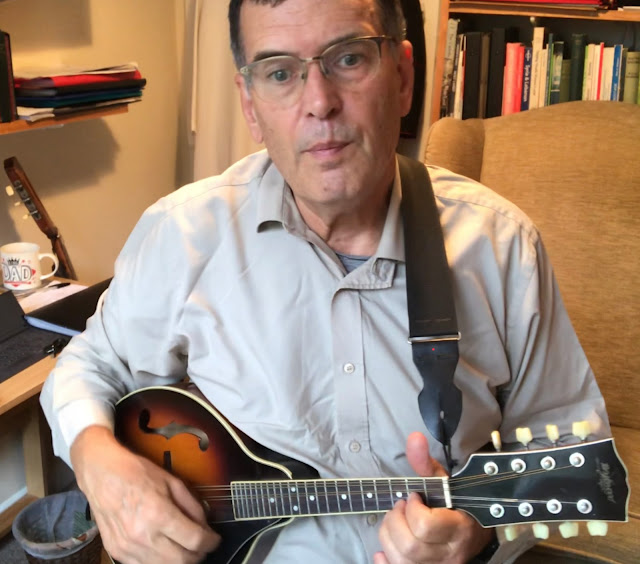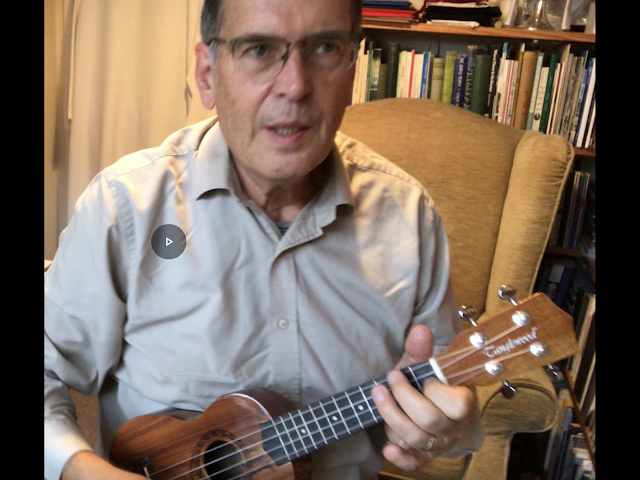Making music I
I have three stringed friends who’ve been keeping me occupied through lockdown - my guitar, mandolin and ukelele. Depending on my mood I can pick up either one of them and continue conversation with the instrument. That means playing, either picking or strumming, and often singing. I’m not as good at playing a melody on them but quite good at strumming to accompany a melody already in my head. It’s really therapeutic day by day, even on my own, though I prefer playing along with family members, friends and groups I’m in.
I was given my guitar forty years ago by a musical friend whose son wasn’t interested in it. It’s classical which means it’s got nylon strings, has a great sound and stays in tune well. It’s the only stringed instrument I’ve got on which I can easily do ‘arpeggio’, individual notes rather than just chords. It’s lovely to play a tune note by note repeating it to perfection - or part perfection! The action of making music takes you out of yourself once you get the basic idea of the instrument and can play almost without looking at your fingers.
I bought my mandolin before a family camping holiday thirty years ago. The idea was to learn to play basic chords over the time we were away knowing my instrument would fit in the car with the five of us. The family were and are long suffering, especially with the mandolin which is amazingly loud, so much so that I was asked to play it to get people out of their houses for the NHS clapping on Thursdays earlier this year! Because a mandolin has metal strings you play with a plectrum, plastic as thin as possible so it plays quiet.
The advantage of my ukelele is its portability which I think is the main cause of the sales explosion for this four stringed instrument. Knowing how to play guitar and mandolin chords makes it easy to pick up strumming a tune and to my delight a lot of tunes using F with C and G chords are far easier on the ukelele. It’s taken me some time to get the most comfortable posture with my uke when I play standing as it's so small and I’m loath to deface it by drilling a hole in its side for a strap.Sometimes I use a strap which clamps into the sound hole and goes round my neck.
I love joining the Newick folk group month by month at the Crown pub in their session which takes all comers. The leader Alan Rae is a friend going back to student days at St John’s College in Oxford. It’s great to play alongside such a variety of instruments with one of my own three: guitar, mandolin and ukelele. We all generally have a turn taking a lead over the course of the evening supported by applause from the pub audience and complimentary food. Making music together is a cheering business which always leaves me with ideas for music homework. The picture is of our August 2020 social distanced session in Alan’s garden.
Irish folk music has been one of my discoveries in recent years thanks to playing in Newick Folk group’s open sessions first Sunday’s at The Crown in Newick. The picture is of Martin Horsfall who often leads the group on one of his Irish whistles. Melodies are key to Irish music. My own knowledge of melodies of any kind, particularly Christian songs, gives impetus for picking up my uke, mandolin or guitar day by day to accompany a song. The whistle ‘sings you the song’ and is most effective in taking the band from Newick to Galway!
Living in Haywards Heath it's been easy for me to play with WUPS - Weald Ukelele Players and Singers - which meet regularly on Monday nights at the United Services Club. During lockdown WUPS have had great online sessions in which we have taken it in turns to lead singing on our uke from one of the eight WUPS song books with chords. These songs with chords, mainly those known to my age group, are freely available online so even in live sessions I just take my iPad. There’s a good atmosphere among the 30 or so who attend in my case lubricated by a couple of pints of Harveys!
Pleasure to commend my WUPS group who get together to strum our ukuleles, sing along to popular songs and have a fun time month by month. There is no formal instruction, most of that is done on a self help basis at home from books and internet sites (of which there are plenty). It is very much a case of learn a few chords, come along and get swept along by the ongoing music and play whatever chords you are able. No formal registration is necessary, just turn up on the night at Haywards Heath United Services or Zoom via https://wups.info/
Forsaking my guitar, mandolin and ukelele I set forth to London and my first visit to the National Gallery for six months. Naturally I was drawn to pictures of folk drawn to relatives of the stringed friends which have accompanied me in lockdown - Ter Brugghen’s lute player (1624) and Molenaer’s Theorbo and Cittern players (1630-2). You could almost hear the music so intense were the images. The lute player painting owes to Caravaggio’s influence in terms of lighting and up close portrayal, to quote the ever helpful Gallery briefing here reproduced.
One of my favourite songs - play it regularly on guitar - based on John Donne’s immortal line’s ‘No man is an island’ with words and music by Joan Whitney and Alex Kramer.
Sometimes the ukelele is easier than the mandolin or guitar for a song. I find Leonard Cohen’s Hallelujah goes best on my uke as it has lots of C and F chords which neatly switch on that instrument.
I love playing The Fields of Athenry, a recent Irish folk ballad (1979 - Pete St. John) set during the Great Famine of the 1840s, for its haunting melody and theme. The lyrics feature a fictional man from Athenry, County Galway, who stole food for his starving family and is sentenced to transportation to the Australian penal colony at Botany Bay. It’s an anthem for Irish sports supporters.







Comments
Post a Comment